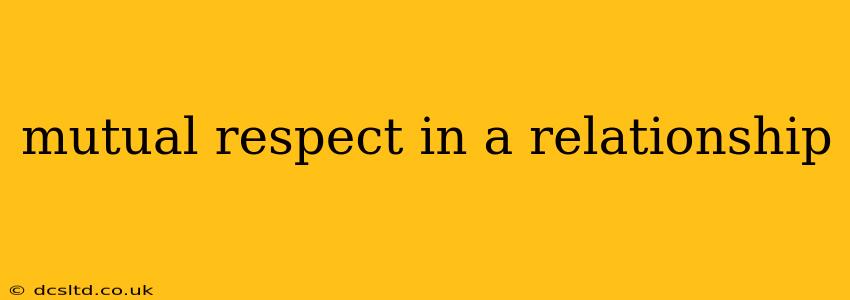Mutual respect forms the bedrock of any healthy and fulfilling relationship, whether romantic, familial, or platonic. It's more than just politeness; it's a deep-seated acknowledgment and appreciation of the other person's inherent worth, individuality, and boundaries. Without it, even the most passionate connections can crumble under the weight of resentment, conflict, and ultimately, disconnection. This article will explore the crucial aspects of mutual respect in relationships and how to cultivate it.
What Does Mutual Respect Look Like in a Relationship?
Mutual respect manifests in numerous ways, both big and small. It's about consistently valuing your partner's thoughts, feelings, and needs, even when they differ from your own. This translates to active listening, honest communication, and a willingness to compromise. It means respecting their personal space, their time, and their decisions, even if you don't fully understand or agree with them.
Here are some key indicators of mutual respect:
- Valuing each other's opinions: Even in disagreement, both partners feel heard and understood. Their perspectives are considered, not dismissed.
- Supporting each other's goals: Partners actively encourage and celebrate each other's achievements, offering help and understanding during challenges.
- Maintaining personal boundaries: Respecting each other's need for alone time, personal space, and individual interests is paramount.
- Honest and open communication: Sharing feelings and thoughts openly and honestly, even difficult ones, without fear of judgment or retaliation.
- Trust and loyalty: Maintaining trust and demonstrating loyalty are essential components of mutual respect.
- Equal partnership: Decisions are made collaboratively, with both partners feeling empowered and valued in the relationship.
How to Build Mutual Respect in a Relationship?
Building mutual respect requires consistent effort and a willingness to self-reflect. It's a continuous process of learning, growing, and adapting together. Here are some practical steps:
- Practice active listening: Pay attention not only to what your partner says but also to their body language and tone. Ask clarifying questions and show genuine interest in their perspective.
- Communicate openly and honestly: Express your needs and feelings clearly and respectfully, even when it's difficult. Avoid accusatory or blaming language.
- Learn to compromise: Relationships require give and take. Be willing to compromise and find solutions that work for both of you.
- Respect each other's boundaries: Understand and respect each other's personal space, time, and limits. Don't pressure your partner to do things they're not comfortable with.
- Practice empathy: Try to see things from your partner's perspective. Even if you don't agree, understanding their viewpoint is key to mutual respect.
- Celebrate each other's successes: Acknowledge and celebrate each other's accomplishments, both big and small. This shows support and appreciation.
- Forgive and move forward: Holding onto past hurts can damage the relationship. Practice forgiveness and focus on building a positive future together.
How Can I Show More Respect in My Relationship?
Showing more respect is a proactive choice. It involves consistent actions that demonstrate your value for your partner. Consider these suggestions:
- Acknowledge your partner's efforts: Express gratitude for the things your partner does, big or small.
- Listen without interrupting: Give your partner your full attention when they're speaking.
- Validate their feelings: Even if you don't share the same feelings, acknowledge their validity.
- Respect their differences: Embrace your partner's unique qualities and perspectives.
- Avoid criticism and judgment: Focus on positive communication and constructive feedback.
- Apologize when necessary: Take responsibility for your actions and apologize sincerely when you've hurt your partner.
What are the Signs of a Lack of Mutual Respect in a Relationship?
Recognizing the absence of mutual respect is equally crucial. Look out for these warning signs:
- Constant criticism and belittling: One partner consistently puts the other down or makes them feel inferior.
- Controlling behavior: One partner tries to control the other's actions, decisions, or social interactions.
- Disrespectful communication: Name-calling, yelling, or using hurtful language.
- Ignoring boundaries: One partner consistently disregards the other's needs and limits.
- Lack of empathy: One partner shows little or no understanding or compassion for the other's feelings.
- Unwillingness to compromise: One partner consistently refuses to compromise or consider the other's needs.
Can a Relationship Recover From a Lack of Mutual Respect?
While rebuilding mutual respect requires significant effort and commitment from both partners, it is possible. Open and honest communication, a willingness to change behaviors, and seeking professional help (e.g., couples therapy) can be vital steps in the recovery process. However, if one or both partners are unwilling to make the necessary changes, the relationship may be irreparably damaged.
Mutual respect isn't a destination; it's a journey requiring continuous effort and commitment from both partners. By prioritizing this fundamental element, you can cultivate a strong, healthy, and fulfilling relationship.
